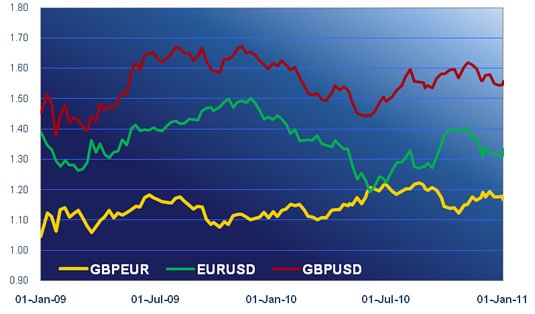– US dollar still out of favour
– Has the market forgiven sterling already?
Good morning. On the 100th anniversary of its invention in Ogden, just north of Salt Lake City, Utah has introduced the Browning M1911 semi-automatic pistol as its official “state firearm”. It joins a list of other official emblems such as the beehive, the state tree (blue spruce), the state flower (sego lily), the state massacre (Mountain Meadows) and the state missile (Minuteman ICBM).
The state of Britain’s economy is equally as controversial. Its latest critics include the Bank of Tokyo-Mitsubishi, who say it is “highly vulnerable to external shocks”, and billionaire punter George Soros, who says “I don’t think [the chancellor’s austerity measures] can be implemented without pushing the economy into a recession.” Surprisingly, when London traders arrived for work on Wednesday morning they held back from joining the criticism. Almost without exception yesterday’s opening levels marked the low of the day for sterling. It went on to add more than a cent against the US dollar, against which – miraculously – it starts today fractionally above its position before Tuesday’s GDP figures kicked it in the groin. It has made a full recovery against the Australian and Canadian dollars too.
The main reason for its renaissance was to be found in the minutes of January’s Monetary Policy Committee (MPC) meeting. For several months there had been a 1-7-1 voting split: Adam Posen wanted to increase the size of the asset purchase stimulus package, Andrew Sentance wanted to raise the Bank Rate by 25 basis points and six of their peers sided with the boss in support of the status quo. That distribution changed in January with Martin Weale joining Mr Sentance to vote for a rate increase. Even though decisions made at that meeting on 13 January could have been overtaken by events, investors were heartened to see that there was at least an inclination to move towards tighter monetary policy.
They were less charitable towards the dollar. Having bashed it in the past for weak housing figures they churlishly refused to give it credit yesterday for a 17.5% monthly increase in new home sales. The dollar actually moved fractionally lower after the announcement. There was a similar lack of interest in Canada’s Teranet house price index, which was down -0.2% in November after declining by -1.1% and -0.4% in September and October.
The impact of the two central bank interest policy decisions overnight had nothing to do with the interest rates they delivered: the Federal Reserve will stick to its 0-0.25% Federal Funds target range “for an extended period” and the Reserve Bank of New Zealand will leave its 3% Official Cash Rate untouched “until the recovery becomes more robust”. Yet the US dollar went down and the New Zealand dollar went up. The difference was in the economic outlooks offered by the two central banks in their statements.
The Fed expressed concern about employment, saying “employers remain reluctant to add to payrolls”. The RBNZ said “forward indicators of activity have firmed somewhat”, citing export volumes and prices, business confidence and housing market activity as factors that are all showing greater promise. There was not a million miles between the sentiments expressed by the Fed and the RBNZ; they are both guardedly optimistic for the future. The different treatment handed out by the market to the Greenback and the Kiwi had more to do with the prejudice of the moment than the meat in the statements.
Sterling’s exposure to ecostats today is limited to Hometrack’s house price index and the CBI’s retail sales figure. Hometrack has already reported a -2.2% monthly fall in January, to which there was zero reaction. The CBI measure is projected to deteriorate from 56 to 38. A cluster of official Euroland confidence indices will be announced this morning, beyond which there is nothing of particular interest from Europe. After lunch come US weekly jobless claims and the anarchic durable goods orders figures. Pending home sales follow in mid-afternoon. Japanese inflation (or deflation) and retail sales come out around midnight.
It would be extraordinary if investors had already been able to put behind them the memory of Tuesday’s GDP calamity but as London opens it is impossible to deny the possibility. Maybe we’re not doomed after all. Wouldn’t that be a turn-up for the books!






